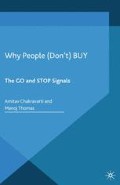Abstract
What has public policy got to do with GO and STOP signals?
Access this chapter
Tax calculation will be finalised at checkout
Purchases are for personal use only
Preview
Unable to display preview. Download preview PDF.
References
Titmuss, R. M. (1970), The Gift Relationship, Allen & Unwin.
Titmuss, R. M. (1971), The Gift of Blood, Trans-action, VIII, now in R. M. Titmuss, B. Abel-Smith and K. Titmuss (eds) (1987), The Philosophy of Welfare, Selected Writings, Allen & Unwin.
Mellström, Carl and Johannesson, Magnus (2008), Crowding Out In Blood Donation: Was Titmuss Right?, Journal of the European Economic Association, Vol. 6, Issue 4, June, 845–63.
Gneezy, Uri and Rustichini, Aldo (2000), A Fine Is a Price, Journal of Legal Studies, January, 1–17.
Goldstein, Noah J., Cialdini, Robert B. and Griskevicius, Vladas (2008), A Room With a Viewpoint: Using Social Norms to Motivate Environmental Conservation in Hotels, Journal of Consumer Research, Vol. 35, No. 3 (October), 472–82.
Ruff, C. C., Ugazio, G. and Fehr, E. (2013), Changing Social Norm Compliance with Noninvasive Brain Stimulation, Science, Vol. 342 (October), 482–4.
Desilver, Drew (2014), Voter Turnout Always Drops off for Midterm Elections, But Why?, Pew Research Center Report, http://www.pewresearch.org/facttank/2014/07/24/voter-turnout-always-drops-off-for-midterm-elections-but-why/, date accessed 2 November 2014.
Funk, Patricia (2010), Social Incentives and Voter Turnout: Evidence from the Swiss Mail Ballot System, Journal of the European Economic Association, 8 (5), 1077–1103.
Spector, Mike (2007), The Economics of Hybrids, Wall Street Journal, 29 October.
NHTSA (National Highway Traffic Safety Administration) press release (2009), Cash for Clunkers Wraps up with Nearly 700,000 Car Sales and Increased Fuel Efficiency, U.S. Transportation Secretary LaHood Declares Program “Wildly Successful”, 26 August.
Simon, Stephanie (2010), The Secret to Turning Consumers Green, Wall Street Journal, 18 October.
Beacon Hill Institute Report (2012), Two Years of the Washington, DC. Bag Tax: An Analysis, August, 1–13.
Nolan, Jessica M., Schultz, Wesley P., Cialdini, Robert B., Goldstein, Noah J. and Griskevicius, Vladas (2008), Normative Social Influence is Underdetected, Personality and Social Psychology Bulletin, Vol. 34, No. 7, 913–23.
Allcott, Hunt and Mullainathan, Sendhil (2010), Behavior and Energy Policy, Science, Vol. 327, March, 1204–5.
URLs for Southwest Florida Water Management District “Skip a Week” Television
Commercials, http://www.youtube.com/watch?v=P-5Jf3Kaa0Q; http://www.youtube.com/watch?v=gdftnNVC6Gg; http://www.swfwmd.state.fl.us/conservation/ads/, date accessed 2 November 2014.
Southwest Florida Water Management District 2009–2010 “Skip a Week” Campaign Summary, https://www.swfwmd.state.fl.us/files/database/social_research/37/Social_Marketing_Skip_A_Week_Final_Summary_PDF.pdf date accessed 2 November 2014.
Frey, B. S. and Oberholzer-Gee, F. (1997), The Cost of Price Incentives: An Empirical Analysis of Motivation Crowding-Out, American Economic Review, 87 (4), 746–55.
Kahan, D. M. (2003), The Logic of Reciprocity: Trust, Collective Action, and Law, Michigan Law Review, 102 (1), 71–103.
Banerjee, Abhijit V. and Duflo, Esther, Poor Economics: A Radical Rethinking of the Way to Fight Global Poverty, PublicAffairs.
Fiszbein, Ariel and Schady Norbert (2009), Conditional Cash Transfers: Reducing Present and Future Poverty, World Bank Policy Research Report.
Lomelí, Enrique Valencia (2008), Conditional Cash Transfer Programs: Achievements and Illusions, Global Social Policy, Vol. 9 (2), 167–71.
Author information
Authors and Affiliations
Copyright information
© 2015 Amitav Chakravarti and Manoj Thomas
About this chapter
Cite this chapter
Chakravarti, A., Thomas, M. (2015). Why paying people to donate blood does not pay. In: Why People (Don’t) BUY. Palgrave Macmillan, London. https://doi.org/10.1057/9781137466693_10
Download citation
DOI: https://doi.org/10.1057/9781137466693_10
Publisher Name: Palgrave Macmillan, London
Print ISBN: 978-1-349-49988-5
Online ISBN: 978-1-137-46669-3
eBook Packages: Palgrave Business & Management CollectionBusiness and Management (R0)

